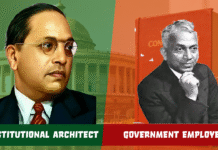Liberty, Equality, Fraternity: Ambedkar’s Constitutional Trinity and the Philosophical Underpinnings of His Legal Vision
Dr. Bhimrao Ramji Ambedkar’s constitutional philosophy represents one of the most sophisticated syntheses of Eastern wisdom and Western jurisprudence in modern political thought. His articulation of liberty, equality, and fraternity as the foundational trinity of democratic governance emerged not merely as adapted concepts from the French Revolution, but as a deeply considered philosophical framework rooted in Buddhist ethics, Western legal positivism, and pragmatic constitutional design. This trinity, embedded within the Indian Constitution, reflects Ambedkar’s vision of law as both a transformative social instrument and a bulwark against systemic oppression, establishing what he termed “constitutional morality” as the guiding principle of democratic governance.

The Genesis of Ambedkar’s Constitutional Philosophy
Ambedkar’s constitutional thinking evolved through decades of intellectual engagement with both ancient Buddhist texts and modern Western political theory. His famous declaration in 1954 revealed the depth of this philosophical synthesis: “My social philosophy may be said to be enshrined in three words: liberty, equality, and fraternity. Let no one, however, say that I have borrowed my philosophy from the French Revolution. I have not. My philosophy has roots in religion and not in political science. I have derived them from the teachings of my master, the Buddha.” This statement illuminates the fundamental distinction between mere political borrowing and genuine philosophical derivation that characterized Ambedkar’s approach to constitutional design.
The evolution of this trinity in Ambedkar’s thought demonstrates a sophisticated understanding of both philosophical continuity and practical necessity. Initially, in works like “Annihilation of Caste” (1936), he referenced these principles within the context of the French Revolutionary tradition. However, as his Buddhist studies deepened, particularly through his engagement with democratic principles within ancient Buddhist sanghas, he began to reframe these concepts as inherently Buddhist in origin. This intellectual journey reflects not inconsistency but rather the deepening of his understanding of how universal democratic principles could find authentic expression within Indian philosophical traditions.
Buddhist Foundations of Democratic Governance
Ambedkar’s legal philosophy drew extensively from his interpretation of Buddhist political theory, particularly the democratic governance structures of ancient Buddhist monastic communities. His research into Buddhist texts revealed what he considered to be proto-democratic institutions that predated Western democratic traditions by centuries. The Buddhist sangha, with its emphasis on collective decision-making, equality among members regardless of birth status, and moral governance, provided Ambedkar with an indigenous foundation for democratic constitutionalism that could challenge Hindu hierarchical structures.
The Buddhist concept of Dhamma formed the philosophical core of Ambedkar’s constitutional morality. He interpreted Dhamma not merely as religious doctrine but as a comprehensive framework for ethical governance that encompassed what he termed “Prajna” (understanding), “Sila” (good action), and “Karuna” (compassion). These principles, Ambedkar argued, provided the moral foundation necessary for democratic institutions to function effectively in a society marked by deep social divisions. His work “The Buddha and His Dhamma” articulated this vision of Buddhist political theory as fundamentally compatible with, and indeed foundational to, modern constitutional democracy.
Western Philosophical Influences and Intellectual Synthesis
Ambedkar’s constitutional philosophy was equally shaped by his rigorous training in Western legal and political thought during his studies at Columbia University and the London School of Economics. His exposure to John Dewey’s pragmatism proved particularly influential, providing him with a framework for understanding democracy not merely as a political system but as “a way of life”. Dewey’s emphasis on experimental democracy and social reconstruction resonated deeply with Ambedkar’s own vision of using constitutional law as an instrument of social transformation.
The influence of Edmund Burke’s constitutional thought is evident in Ambedkar’s understanding of constitutional morality and the importance of institutional restraint. Burke’s concept of prescription and constitutional conventions informed Ambedkar’s belief that successful democratic governance required not merely legal frameworks but cultivated habits of constitutional behavior. This influence is particularly apparent in his famous observation that “constitutional morality is not a natural sentiment. It has to be cultivated”. Similarly, Jeremy Bentham’s legal positivism and utilitarian calculus influenced Ambedkar’s approach to constitutional design, particularly his emphasis on measurable social outcomes and the greatest good for the greatest number.
The Constitutional Trinity: Philosophical Architecture
Liberty: Beyond Negative Freedom
Ambedkar’s conception of liberty transcended the classical liberal notion of negative freedom from state interference. His understanding, shaped by both Buddhist concepts of liberation and Western theories of positive liberty, emphasized what he termed “substantive liberty”—the actual capacity of individuals to pursue their life goals without the constraints of social hierarchy or economic deprivation. This vision is evident in his constitutional drafting, where fundamental rights were conceived not merely as protections against state power but as positive entitlements requiring active state intervention to ensure their realization.
His legal philosophy recognized that formal liberty without substantive equality would inevitably result in the “supremacy of the few over the many”. This insight, drawn from both his personal experience of caste-based discrimination and his theoretical engagement with Western liberal thought, informed his constitutional design of Article 15 and Article 17, which not only prohibited discrimination but mandated positive action to eliminate untouchability. Ambedkar’s liberty was thus both a philosophical principle and a practical program for social reconstruction through constitutional means.
Equality: The Challenge to Graded Inequality
Ambedkar’s approach to equality represented perhaps his most radical constitutional innovation. His concept of equality directly confronted what he identified as the fundamental organizing principle of Hindu society—“graded inequality”—where social positions were determined by birth rather than merit or effort. His constitutional vision sought to replace this system with what he termed “constitutional equality,” based on the principle of “one person, one value” rather than hierarchical social ordering.
The philosophical foundation for this approach lay in his interpretation of Buddhist egalitarianism, which he saw as fundamentally opposed to Brahmanical hierarchy. His constitutional drafting of equality provisions went beyond formal legal equality to encompass what contemporary scholars would recognize as substantive equality, including affirmative action measures designed to address historical disadvantage. This approach reflected his understanding that true equality required not merely the removal of formal barriers but positive measures to ensure equal opportunity for participation in democratic life.
Fraternity: The Foundation of Democratic Unity
Perhaps the most innovative aspect of Ambedkar’s constitutional trinity was his emphasis on fraternity as the essential foundation for democratic governance. Unlike liberty and equality, which had established places in Western constitutional thought, fraternity remained an underdeveloped concept in most democratic theories. Ambedkar’s contribution was to identify fraternity—or what he sometimes called the “spirit of brotherhood”—as the necessary condition for the effective functioning of both liberty and equality.
His philosophical understanding of fraternity drew heavily from the Buddhist concept of “maitri” (loving-kindness) and the ideal of universal compassion that transcends particular identities. In the constitutional context, fraternity meant the cultivation of a common national identity that could overcome the divisions of caste, religion, and region that marked Indian society. His famous warning that “without fraternity, liberty would destroy equality and equality would destroy liberty” reflected his understanding that democratic institutions required not merely legal frameworks but shared commitment to democratic values.
Constitutional Morality and Legal Positivism
Central to Ambedkar’s legal philosophy was the concept of constitutional morality, which he distinguished sharply from what he termed “social morality.” Drawing from George Grote’s definition, Ambedkar understood constitutional morality as “paramount reverence for the forms of the Constitution” that created “perfect confidence” among citizens that constitutional procedures would be respected even during intense political conflict. This concept represented his solution to the problem of creating democratic stability in a society marked by deep social divisions and hierarchical traditions.
Ambedkar’s emphasis on constitutional morality reflected his legal positivist training, which emphasized the importance of clear legal rules and institutional procedures over customary social practices. However, his legal positivism was tempered by his understanding that law alone could not guarantee democratic outcomes without a supporting culture of constitutional behavior. His constitutional design therefore included both robust legal safeguards and provisions intended to cultivate democratic habits and values over time.
The Practical Constitutional Framework
Ambedkar’s constitutional philosophy found concrete expression in the institutional design of the Indian Constitution, which he chaired as head of the Drafting Committee. His approach to constitutional architecture reflected his understanding that successful democratic governance required both strong institutions and flexible adaptation to changing circumstances. The Constitution’s provisions for fundamental rights, directive principles, and federal structure all bear the imprint of his philosophical synthesis of Buddhist ethics, Western constitutionalism, and pragmatic governance.
The fundamental rights provisions, particularly Articles 14-18, reflect Ambedkar’s understanding of liberty and equality as complementary rather than competing principles. His drafting of Article 32, which he called the “very heart and soul” of the Constitution, established the Supreme Court’s role as guardian of constitutional rights—a reflection of his legal positivist belief in the importance of judicial enforcement of constitutional principles. The directive principles, meanwhile, embodied his vision of the state’s positive obligations to create conditions for substantive equality and social justice.
Contemporary Relevance and Enduring Legacy
Ambedkar’s constitutional philosophy continues to provide vital insights for contemporary challenges to democratic governance. His understanding that democracy requires not merely institutional frameworks but cultivated habits of constitutional behavior speaks directly to current concerns about democratic backsliding and institutional erosion. His emphasis on constitutional morality as a bulwark against majoritarianism offers important guidance for protecting minority rights and maintaining democratic pluralism in diverse societies.
The philosophical foundations of his constitutional trinity—the synthesis of Buddhist ethics with Western constitutionalism—suggests possibilities for developing authentically indigenous approaches to democratic governance that need not simply mirror Western models. His vision of law as a transformative social instrument, capable of challenging entrenched hierarchies and creating new possibilities for human flourishing, remains relevant for societies grappling with structural inequality and social exclusion.
Conclusion
Ambedkar’s constitutional trinity of liberty, equality, and fraternity represents far more than a borrowing of French Revolutionary slogans. It embodies a sophisticated philosophical synthesis that drew from Buddhist ethical traditions, Western legal thought, and pragmatic constitutional design to create a framework for democratic governance capable of addressing the challenges of a deeply divided society. His legal philosophy, grounded in the concept of constitutional morality and animated by the vision of substantive equality, offers enduring insights for the ongoing project of democratic constitutionalism. The philosophical underpinnings of his legal vision—combining ancient wisdom with modern institutional design—continue to provide guidance for those seeking to create more just and inclusive forms of democratic governance. As contemporary democracies face new challenges from authoritarianism and social fragmentation, Ambedkar’s constitutional philosophy offers both inspiration and practical guidance for the defense and renewal of democratic institutions.
- https://velivada.com/2020/02/29/my-philosophy-of-life-babasaheb-ambedkar/
- https://www.jetir.org/papers/JETIR2007467.pdf
- https://journals.library.brandeis.edu/index.php/caste/article/download/2289/1811/5633
- https://www.drishtiias.com/daily-updates/daily-news-analysis/democratic-vision-of-ambedkar
- https://en.wikipedia.org/wiki/The_Buddha_and_His_Dhamma
- https://aeon.co/essays/what-ambedkar-learned-from-dewey-and-brought-to-india
- https://imrjr.com/wp-content/uploads/2025/04/IMRJR.2025.020406.pdf
- https://papers.ssrn.com/sol3/Delivery.cfm/SSRN_ID4312052_code4796295.pdf?abstractid=4312052&mirid=1
- https://plato.stanford.edu/entries/bentham/
- https://ijcrt.org/papers/IJCRT2408777.pdf
- https://www.bbau.ac.in/Docs/FoundationCourse/TM/MPDC405/Block-4%20Ambedkar%20on%20social%20justice-1.pdf
- https://journals.library.brandeis.edu/index.php/caste/article/download/282/63/1050
- https://www.iosrjournals.org/iosr-jhss/papers/Vol19-issue3/Version-4/F019342936.pdf
- https://voiceofresearch.org/Doc/Sep-2024/Sep-2024_3.pdf
- https://www.telegraphindia.com/opinion/a-buddhist-vision-the-constitution-is-a-continuum-of-buddhas-revolution/cid/1907436
- https://www.roundtableindia.co.in/dr-babasaheb-ambedkar-s-idea-on-an-ideal-democracy-ritesh-j/
- https://lhsscollective.in/babasaheb-ambedkars-thoughts-on-fraternity/
- https://www.drishtiias.com/to-the-points/Paper2/constitutional-morality
- https://aud.delhi.gov.in/sites/default/files/2024-01/slgr-readings/mp_singh_observing_constitutional_morality.pdf
- https://testbook.com/ias-preparation/constituent-assembly-debates
- https://academic.oup.com/book/57546/chapter/468612245
- https://www.telegraphindia.com/opinion/br-ambedkars-warnings-the-indian-constitution-at-75/cid/2079466
- https://ramachandraguha.in/archives/constitution75-ambedkars-warnings-the-telegraph.html
- https://velivada.com/2024/01/25/ambedkars-constitutional-vision-of-inclusion-in-india/
- https://dcac.du.ac.in/assets/pdf/Journal/Vol-3/Issue2/13.pdf
- https://theacademic.in/wp-content/uploads/2024/12/69.pdf
- https://carnegieendowment.org/posts/2015/12/which-ambedkar?lang=en
- https://www.mea.gov.in/images/attach/amb/volume_01.pdf
- https://research.jgu.edu.in/ambedkars-debate-on-equality-and-liberty-fraternity-as-political-normative/
- https://caravanmagazine.in/religion/dignity-fraternity-knowledge-lessons-on-ambedkars-social-democracy-from-deeksha-bhoomi
- https://www.drishtiias.com/daily-updates/daily-news-analysis/philosophical-perspectives-of-dr-br-ambedkar
- https://www.forwardpress.in/2017/08/exploring-the-influence-of-russell-on-ambedkar/
- https://blog.ipleaders.in/social-democracy-dr-ambedkar/
- https://ijrpr.com/uploads/V6ISSUE4/IJRPR43654.pdf
- https://www.allsubjectjournal.com/assets/archives/2021/vol8issue7/8-6-52-487.pdf
- https://countercurrents.org/2022/04/dr-b-r-ambedkars-idea-of-social-democracy/
- https://papers.ssrn.com/sol3/Delivery.cfm/SSRN_ID4221933_code3317754.pdf?abstractid=4221933&mirid=1
- https://en.wikipedia.org/wiki/Jeremy_Bentham
- https://egyankosh.ac.in/bitstream/123456789/89323/1/Block-4.pdf
- https://cdnbbsr.s3waas.gov.in/s3ec0490f1f4972d133619a60c30f3559e/uploads/2024/07/2024070860.pdf
- https://www.barandbench.com/columns/dr-ambedkar-1949-constituent-assembly-speech
- https://allindialegalforum.wordpress.com/2022/04/07/ambedkars-three-warnings%EF%BF%BC/
- https://www.bbc.com/news/world-asia-india-65175711
- https://qtanalytics.in/journals/index.php/IJHIR/article/download/182/87/
- https://thebasicstructureconlaw.wordpress.com/2022/11/26/remembering-ambedkars-last-speech-in-the-constituent-assembly/
- https://tathagat.live/blogs/book-summary/the-buddha-and-his-dhamma
- https://mls.org.in/books/HB-2667%20CPA%20Speaches%20(Eng).pdf
- https://drambedkarbooks.com/wp-content/uploads/2009/03/buddha-and-his-dhamma.pdf
- https://www.allaboutambedkaronline.com/post/states-and-minorities-what-are-their-rights-and-how-to-secure-them-a-critical-overview
- https://swarajyamag.com/politics/the-ambedkar-paradox-why-congresss-constitutional-champion-claim-rings-hollow
- https://www.constitutionofindia.net/historical-constitution/states-and-minorities-dr-b-r-ambedkar-1947/
- https://en.wikipedia.org/wiki/B._R._Ambedkar
- https://drambedkarbooks.com/wp-content/uploads/2009/03/federation-versus-freedom.doc
- https://www.rjpn.org/ijcspub/papers/IJCSP13A1008.pdf
- https://forum.nls.ac.in/slr-forum-blog/rescuing-duty-from-fundamentalism-an-ambedkarite-re-imagining-of-part-iv-a-of-the-constitution/
- https://magazines.odisha.gov.in/orissareview/2018/Jan/engpdf/67-73.pdf
- https://clpr.org.in/blog/why-ambedkar-opposed-an-indian-constituent-assembly/
- https://ijrpr.com/uploads/V6ISSUE4/IJRPR42574.pdf
- https://www.reddit.com/r/IndianHistory/comments/1jyv949/ambedkar_on_pakistan_partition_and_islam_why_he/
- https://www.mea.gov.in/Images/attach/amb/Volume_09.pdf



















